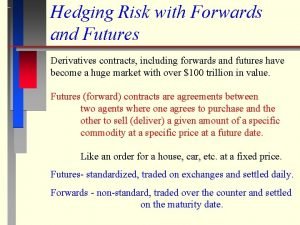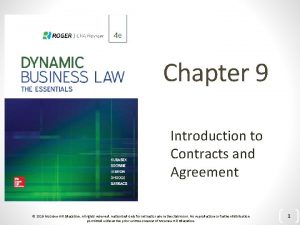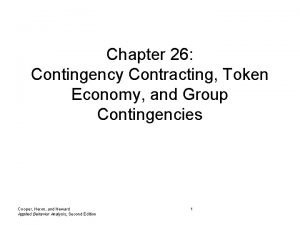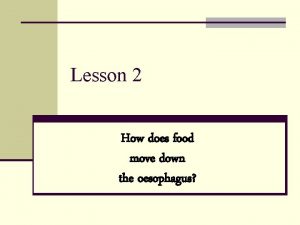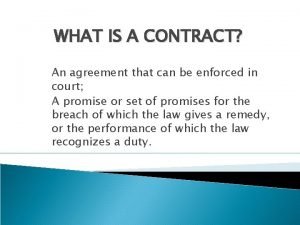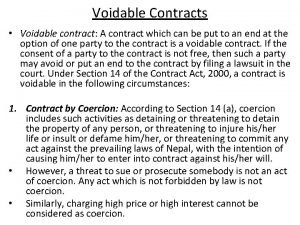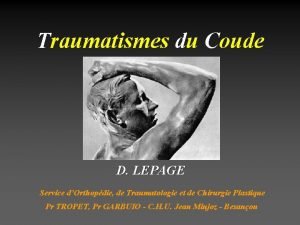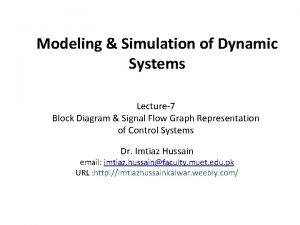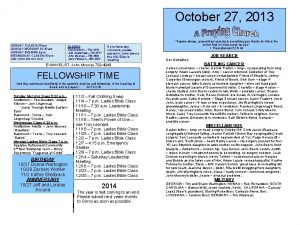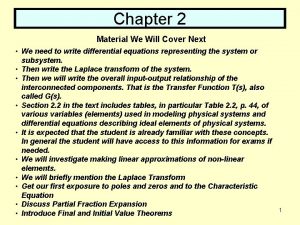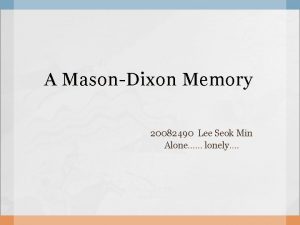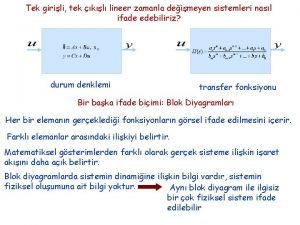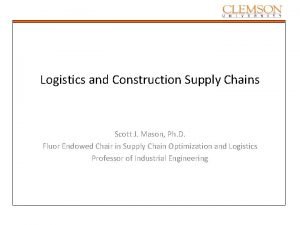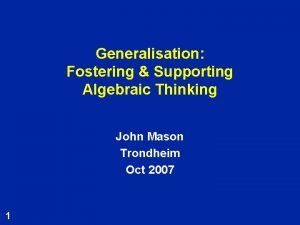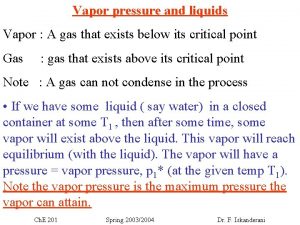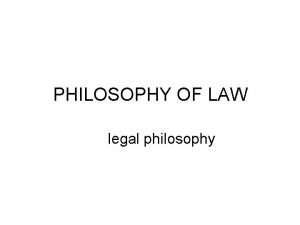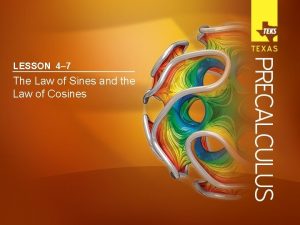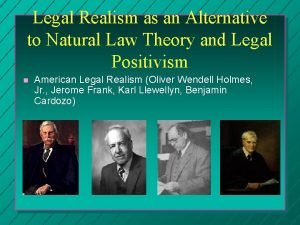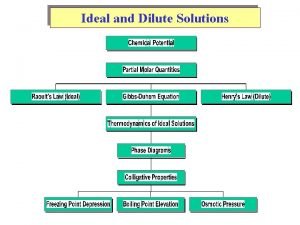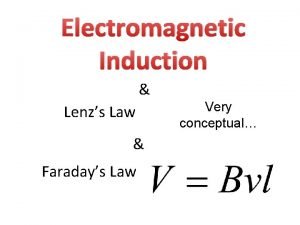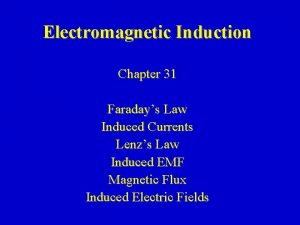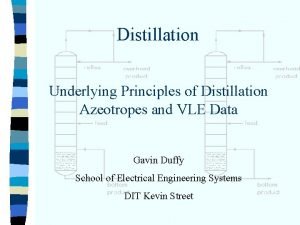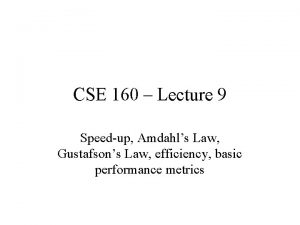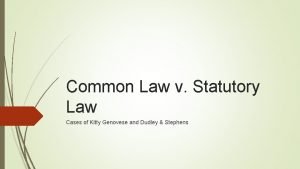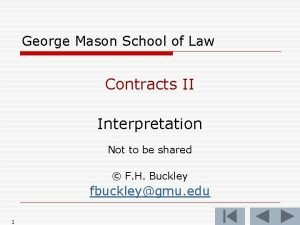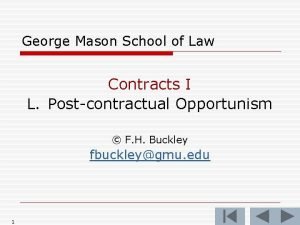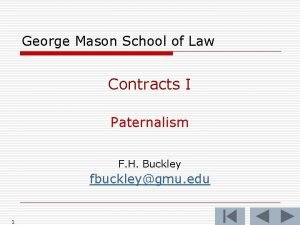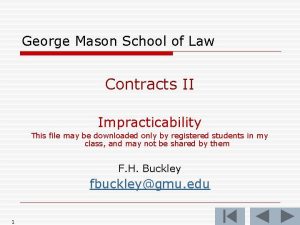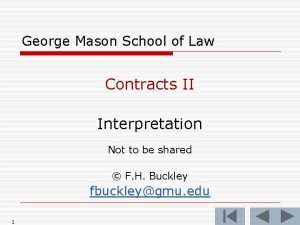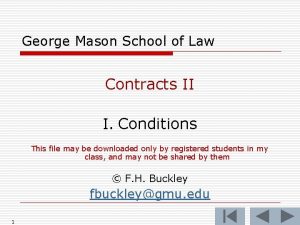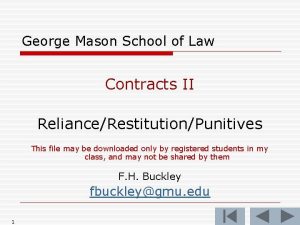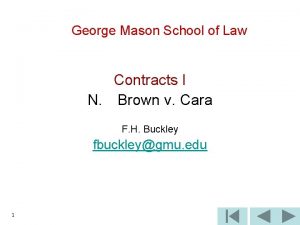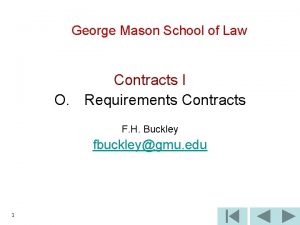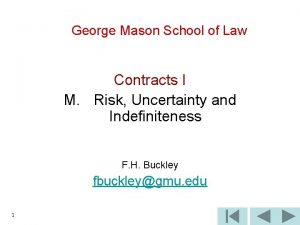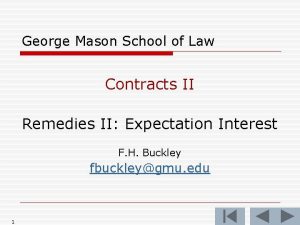George Mason School of Law Contracts II Capacity


































































































































































- Slides: 162

George Mason School of Law Contracts II Capacity F. H. Buckley fbuckley@gmu. edu 1

What does it mean to choose badly? – Immoral choices • Common Law and Statutory Illegality 2

What does it mean to choose badly? – Immoral choices – Choices that Harm Others • Third party externalities 3

What does it mean to choose badly? – Immoral choices – Choices that Harm Others – Self-defeating Choices 4

What does it mean to choose badly? – Immoral choices – Choices that Harm Others – Self-defeating Choices • Capacity: “I wanted x but somehow I chose not-x” 5

What does it mean to choose badly? – Immoral choices – Choices that Harm Others – Self-defeating Choices • Consent: fraud, force 6

What does it mean to choose badly? n. Capacity n. I lacked the ability to chose rationally (i. e. , to advance my interests) 7

Economists have a narrow definition of rationality • With full capacity, free bargaining makes people better off… • Provided that we assume that their choices satisfy the assumptions of rational choice 8

Rational Choice: Six Assumptions 9

Rational Choice: Six Assumptions • Full Information 10

Rational Choice: Six Assumptions • Full Information • Choices are Freely Made 11

Rational Choice: Six Assumptions • Full Information • Choices are Freely Made • Non-satiation 12

Rational Choice: Six Assumptions • • 13 Full Information Choices are Freely Made Non-satiation Completeness or comparability

Rational Choice: Six Assumptions • • • 14 Full Information Choices are Freely Made Non-satiation Completeness or comparability No third party effects (externalities)

Rational Choice: Six Assumptions • • • 15 Full Information Choices are Freely Made Non-satiation Completeness or comparability No third party effects (externalities) Perfect rationality

Rational Choice: Six Assumptions • With all those assumptions, a strong presumption that our choices make us better off 16

Rational Choice: Six Assumptions • Full Information (later) – No mistakes – No misrepresentations – And no informational asymmetries 17

Rational Choice: Six Assumptions • Full Information • Choices Are Freely Made (later) – No duress – Unconscionability? 18

Rational Choice: Six Assumptions • Full Information • Choices Are Freely Made • Non-satiation – More is always better 19

Non-satiation: B > A Good 1 More is always better B A Good 2 0 20

Non-satiation: B > A Good 1 More is always better B YB YA A YB > Y A Good 2 0 XA XB XB > X A 21

Rational Choice: Six Assumptions • • 22 Full Information Choices Are Freely Made Non-satiation Completeness or comparability

Comparability: No incommensurabilities No black holes 23

Rational Choice: Six Assumptions • • • 24 Full Information Choices are Freely Made Non-satiation Completeness or comparability No third party effects (externalities)

Third party effects: Bargaining with a third person Mary Representing Anne’s utility on a third dimension. Anne (Please put on your 3 -D glasses now. ) Bess 25

Third party effects: Bargaining with a third person Mary The intersection of the three indifference curves in three dimensional space is the “bargaining core” Ann The bargaining lens in three dimensions Bess 26

What happens if third parties can’t be joined? • Paretian norms don’t work if Coasian bargains are impossible because of transaction costs • External Costs and Tort Law 27

But nearly everything has third party effects… • Do we then abandon the concept of efficiency? • A more relaxed standard: Kaldor-Hicks efficiency • A transformation is Kaldor-Hicks efficient when the winners could compensate the losers (“Potential Pareto-Efficiency”) and satisfy Paretian standards 28

Explaining Kaldor-Hicks: C is Pareto-inferior to A Moving from A to C makes Mary worse off Bess A C Mary 29

But C is Kaldor-Hicks Efficient to A 1. At C Bess is on IC and better off than she is at A on IA Bess A C IC IA Mary 30

C is Kaldor-Hicks Efficient to A 2. At C Bess could give up CB roses to Mary to move to B and be on IB, where Bess would be better off than she was on IA Bess A C B IB IC IA Mary 31

C is Kaldor-Hicks Efficient to A 3. At B Mary would be no worse off than at A. Bess A C B IB IC IA Mary 32

Kaldor-Hicks Efficiency C is Pareto-inferior to A but Bess could make it Pareto-superior by transferring wealth to Mary Bess A C B IB IC Mary 33 “Potential Pareto-superiority” IA

Examples of Kaldor-Hicks Efficiency • It is proposed to abandon steel tariffs that impose costs of $10 B on consumers but provide steel manufacturers with a gain of $1 B. • The bankruptcy of a failing business imposes a cost to shareholders and employees of $1 M, but provides a benefit of $5 M to creditors. 34

Rational Choice: Six Assumptions • • • 35 Full Information Choices are Freely Made Non-satiation Completeness or comparability No third party effects (externalities) Perfect rationality

Perfect Rationality: Transitivity A Technical Definition • If A is preferred to B and B is preferred to C, then A is preferred to C – A}B, B}C A}C – } = “is preferred to” 36

Relaxing the Rationality Assumption: Transitivity: A Technical Definition • If A is indifferent to B and B is indifferent to C, then A is indifferent to C – A B, B C A C – ~ = “is indifferent to” 37

We assume more is better Good 1 B YB YA A YB } Y A Good 2 0 XA XB XB } X A 38

Transitivity: A}B, B}C A}C Good 1 A B C Good 2 0 39

Violation of Transitivity Indifference curves can’t touch Good 1 If a ~ c and c~ b, then a ~ b. But b > a, so b } a A violation of transitivity a b c Good 2 40 0

But just who is irrational here? Any intransitive preferences here? 41

Relaxing the rationality assumption: Paternalism • Suppose that, lacking perfect rationality, we knew that our choices might harm us. • Might we not, in such cases, wish to let the paternalist choose for us? 42

Relaxing the rationality assumption: Paternalism • The standard cases – Minors – Mental defectives – Inebriatated, drugged… 43

Minors: What’s wrong with this picture? • The standard cases – Minors – Mental defectives – Inebriatated, drugged… 44

Differential risk aversion • Was Jack wrong to buy the beanstock? 45

Capacity: Minors Restatement § 12(1): No one can be bound by contract who has not legal capacity to incur at least voidable contractual duties. Capacity to contract may be partial and its existence in respect of a particular transaction may depend upon the nature of the transaction or upon other circumstances. (2) A natural person who manifests assent to a transaction has full legal capacity to incur contractual duties thereby unless he is (a) under guardianship, or (b) an infant, or (c) mentally ill or defective, or (d) intoxicated 46

Capacity: Minors Restatement § 12(1): No one can be bound by contract who has not legal capacity to incur at least voidable contractual duties. Capacity to contract may be partial and its existence in respect of a particular transaction may depend upon the nature of the transaction or upon other circumstances. (2) A natural person who manifests assent to a transaction has full legal capacity to incur contractual duties thereby unless he is (a) under guardianship, or (b) an infant, or (c) mentally ill or defective, or (d) intoxicated 47

Restatement § 14: Infants Unless a statute provides otherwise, a natural person has the capacity to incur only voidable contractual duties until the beginning of the day before the person's eighteenth birthday. 48

Infants: Kiefer at 465 • What happened? – Who brought the action? 49

Infants: Kiefer • What happened? – How old was Kiefer? – Voidable at the option of the minor • Disaffirming the contract 50

Infants: Kiefer • What about the mature 16 year old? – Or the married person under the age of majority? 51

Infants: Kiefer • What about the immature 25 year-old? 52

Infants: Kiefer • Bright line standards are both over- and under-inclusive • So how to justify them? 53

Infants: Kiefer • Bright line standards are both over- and under-inclusive • But economize on screening costs 54

Infants: Kiefer • Did the Δ know that the Π was an emancipated minor? 55

Infants: Kiefer • Did the Δ know that the Π was a minor? – Should the Δ have known? 56

Infants: Kiefer • Did you never get carded? 57

Infants: Kiefer • Did the Δ know that the Π was an emancipated minor? – Contrast Restatement § 15. 58

Restatement § 15: Mental Illness (1) A person incurs only voidable contractual duties by entering into a transaction if by reason of mental illness or defect (b) he is unable to act in a reasonable manner in relation to the transaction and the other party has reason to know of his condition. Why a difference? 59

Infants: Kiefer o. What if the infant had lied about his age? 60

Infants: Kiefer • What if the infant had lied about his age? – Wisconsin Loan at 467 61

Merchant Protection What if he presents a fake ID? 62

Merchant Protection • What about the age of majority clause in the contract? 63

Merchant Protection • What about the age of majority clause in the contract? – Why did the court say that this did not provide evidence of an intent to defraud? • What is scienter? • Why no reliance by the merchant? 64

What about internet purchases? 65

Merchant Protection o. If the contract is properly disaffirmed by the minor, who is liable for depreciation? n Halbman at 470 n Doenges-Long v. Gillen at 471 66

Affirming the Contract • What if the minor doesn’t disaffirm the contract on reaching the age of majority? – Bobby Floars at 472 67

Why an exception for necessities? 68

Why an exception for necessities? • Are cars necessities? 69

George Mason School of Law Contracts II Capacity F. H. Buckley fbuckley@gmu. edu 70

Infants • The children’s rights movement 71

Capacity: The Mentally Ill Restatement § 12(1): No one can be bound by contract who has not legal capacity to incur at least voidable contractual duties. Capacity to contract may be partial and its existence in respect of a particular transaction may depend upon the nature of the transaction or upon other circumstances. (2) A natural person who manifests assent to a transaction has full legal capacity to incur contractual duties thereby unless he is (a) under guardianship, or (b) an infant, or (c) mentally ill or defective, or (d) intoxicated 72

Mental Illness • § 15(1). A person incurs only voidable contractual duties by entering into a transaction if by reason of mental illness or defect – (a) he is unable to understand in a reasonable manner the nature and consequences of the transaction, or 73

Mental Illness • § 15(1). A person incurs only voidable contractual duties by entering into a transaction if by reason of mental illness or defect – (a) he is unable to understand in a reasonable manner the nature and consequences of the transaction, or – (b) he is unable to act in a reasonable manner in relation to the transaction and the other party has reason to know of his condition. 74

Mental Illness • § 15(1). A person incurs only voidable contractual duties by entering into a transaction if by reason of mental illness or defect – (a) he is unable to understand in a reasonable manner the nature and consequences of the transaction, or – (b) he is unable to act in a reasonable manner in relation to the transaction and the other party has reason to know of his condition. 75

Mental Illness • § 15(2). Where the contract is made on fair terms and the other party is without knowledge of the mental illness or defect, the power of avoidance under Subsection (1) terminates to the extent that the contract has been so performed in whole or in part or the circumstances have so changed that avoidance would be unjust. In such a case a court may grant relief as justice requires. 76

Mental Illness • What’s the rationale for merchant protection here, but not for infants? 77

Faber at 474 • What happened? 78

Faber • So something was excessive here? I don’t get it! 79

Faber • Standards of Incompetency – Capacity to understand: Paine v. Aldrich 80

Faber • Standards of Incompetency – Capacity to understand: Paine v. Aldrich – Loss of Control due to insane impulse in Newton v. Mutual Benefit 81

Faber • Standards of Incompetency – Capacity to understand: Paine v. Aldrich – Loss of Control due to insane impulse in Newton v. Mutual Benefit – Capacity to form a rational judgment or correct conclusions 82

Faber • Which party was in the better position to cure the problem? 83

Faber • How would you have applied Restatement § 15(1)(b)? • A person incurs only voidable contractual duties by entering into a transaction if by reason of mental illness or defect – (a) he is unable to understand in a reasonable manner the nature and consequences of the transaction, or – (b) he is unable to act in a reasonable manner in relation to the transaction and the other party has reason to know of his condition. 84

Faber • What remedy under 15(2)? 85

Mental Illness • § 15(2). Where the contract is made on fair terms and the other party is without knowledge of the mental illness or defect, the power of avoidance under Subsection (1) terminates to the extent that the contract has been so performed in whole or in part or the circumstances have so changed that avoidance would be unjust. In such a case a court may grant relief as justice requires. 86

Is Faber consistent with Uribe at 478? • Should the Δ have been on notice? • “Do you get the sense that the law has not kept pace with modern developments in psychiatry. . ” 87

Uribe • Suppose the contract had been set aside – How might this change the advice you’d give a client who buys from an elderly seller? 88

Intoxicated Persons • Restatement § 16. A person incurs only voidable contractual duties by entering into a transaction if the other party has reason to know that by reason of intoxication (a) he is unable to understand in a reasonable manner the nature and consequences of the transaction, or (b) he is unable to act in a reasonable manner in relation to the transaction. 89

Intoxicated Persons • Restatement § 16. A person incurs only voidable contractual duties by entering into a transaction if the other party has reason to know that by reason of intoxication (a) he is unable to understand in a reasonable manner the nature and consequences of the transaction, or (b) he is unable to act in a reasonable manner in relation to the transaction. • Recall Lucy v. Zehmer 90

Infants, Mental defectives, drunks… • Who are we forgetting? 91

Paternalism’s questionable history So you want to help victims? How about… • Restrictions on women • Slavery 92

The New Paternalism • Unlike the old Paternalism, the new Paternalism does not discriminate • It is also based on better science 93

The New Paternalism: When might our desires misfire? • When might we agree to let the Paternalist second-guess our decisions? – Judgment Biases: Because we miscalculate what is good for us – Akrasia: Because we lack the strength of will to pursue what we know is good for us 94

Judgement Biases • Do we always calculate correctly? – We should have to be monsters of calculation, like Laplace’s Demon. 95

Laplace’s Demon • An intellect which at a certain moment would know all forces that set nature in motion, and all positions of all items of which nature is composed, if this intellect were also vast enough to submit these data to analysis, it would embrace in a single formula the movements of the greatest bodies of the universe and those of the tiniest atom. • For such an intellect nothing would be uncertain and the future just like the past would be present before its eyes. 96

Judgement Biases • Do we always calculate correctly? – We should have to be monsters of calculation, like Laplace’s Demon. – Is that the promise of AI? • The story of Elaine Herzberg • The story of the golem 97

Our brains are not wired like Laplace’s supercomputer • Instead we get through life by relying on heuristics or mental shortcuts: – Intuitions – Hunches – Emotions 98

Otherwise we couldn’t walk and chew gum at the same time Gerald Ford 99

Judgment Biases: Some readings • Vern Smith, Nobel Address 2002 • Gigerenzer, Adaptive Thinking (2000) • Sunstein, Behavioral Law and Economics (2000) 100

Cognitive Paternalism: Judgment Biases • Even if our heuristics and hunches are satisfactory in average cases, they seem to mislead in anomalous cases. 101

Cognitive Paternalism: Judgment Biases • Even if our heuristics and hunches are satisfactory in average cases, they seem to mislead in anomalous cases. • The case of judgment biases: The cognitive paternalist would de-bias us. 102

Some Judgment Biases • The Self-serving Bias – We process away any negative comments about ourselves, and relish positive ones. Great job, Brownie! 103

Paternalism: Some Judgment Biases • The Availability Bias – Pauline Kael on the 1972 election 104

Some Judgment Biases • The Anchoring Bias – I spin a roulette wheel and it comes up 25. Now I ask you how many African members there are in the UN 105

Some Judgment Biases o. The Anchoring Bias n I spin a roulette wheel and it comes up 25. Now I ask you how many African members there are in the UN n I spin and it comes up 65. I ask a different group of people. 106

Some Judgment Biases • The Gambler’s Fallacy – You are at a casino. At the roulette table, the numbers are either red or black. Black has come up six times in a row. What is the probability that it will come up black on the next turn? (Assume a fair table. ) 107

Some Judgment Biases • The Gambler’s Fallacy – You are at a casino. At the roulette table, the numbers are either red or black. Black has come up six times in a row. What is the probability that it will come up black on the next turn? (Assume a fair table. ) – 50%. (You thought the table had a memory? ) 108

Some Judgment Biases • The Hindsight Bias – You watch a 5 -3 baseball game, two men on. Your team is ahead. Your pitcher (ERA of 2. 11) has given up two walks in the bottom of the ninth. Should the manager take him out? 109

Some Judgment Biases • The Hindsight Bias – You watch a baseball game. The pitcher (ERA of 2. 11) has given up two walks in the eighth inning. The manager leaves him in. – The next batter up hits a home run. They win 6 -5. – “Idiot!, ” you say. “I would have taken the pitcher out. ” 110

Judgment Biases Probability Theory: Monty Hall 111

Judgment Biases Probability Theory: Monty Hall O. C. You’re a participant in a game show, facing three doors. Monty tells you that, behind one of three doors, there is a new car, which you’ll get to keep if you pick the right door. The other two doors have goats behind them. Let’s say you pick door 3. 112

Judgment Biases Probability Theory: Monty Hall Monty tells you that, behind one of three doors, there is a new car, which you’ll get to keep if you pick the right door. The other two doors have goats behind them. Let’s say you pick door 3. Monty knows the door behind which the prize is hidden. He now says “I’m going to help you. I’m going to tell you that the prize is not behind door 1. Do you stay with door 3 or do you switch to door 2? 113

Judgment Biases Probability Theory: Monty Hall Stay or switch? 114

Judgment Biases Probability Theory: Monty Hall You should always switch. The probability associated with each door was 1/3. When Monty opened door 1, he did not change the 1/3 probability associated with door 3. The probabilities sum to 1, so the probability associated with door 2 must be 2/3. 115

Do judgment biases justify Paternalism? • Do we underestimate small probability, high magnitude events? – Mandatory catastrophic medical insurance 116

Judgement Biases • Do we always calculate correctly? – Not according to empirical psychologists – And does this open the door to cognitive paternalists? 117

The Counter-revolution • Not so fast, Cass Sunstein 118

The Counter-revolution 1. The defense of heuristic thinking: Gerg Gigerenzer 2. Learning 3. Market Processes 4. The Paternalist’s Judgment Biases 119

Are our heuristics dumb? • Gigerenzer’s fast and frugal heuristics 120 Gerd Gigerenzer

Are our heuristics dumb? • Gigerenzer’s fast and frugal heuristics – Which city has more people: • Sydney or Brisbane? 121

Are our heuristics dumb? • Gigerenzer’s fast and frugal heuristics – Which city has more people: • Sydney or Brisbane? • San Diego or San Antonio? 122

Are our heuristics dumb? • Gigerenzer’s fast and frugal heuristics – “Take the best” cue 123

Are our heuristics dumb? • Gigerenzer’s ecological rationality: how well do our heuristics fit in the world we inhabit. – Who cares if they go wrong in a psychological test if they on average serve us well? 124

Are our heuristics dumb? 125

The defense of Heuristics: Moral Heuristics? – Our reaction to evil is unthinking and immediate. • We don’t have to calculate cost vs benefit • Our moral judgments are coded with an emotional response 126

The Enteric Brain 127

Can the sleep of passion be troubling? Is a very strong emotional attachment a sign of irrationality? 128

Learning o. Are some biases corrected through learning n How to hit a curve ball. 129

Market Processes • Can market processes help? – Would inefficient heuristics tend to get excluded in markets? 130

Or not? 131

What about the Paternalist? • What about the Paternalist’s judgment biases? 132

What about the Paternalist? • What about the Paternalist’s judgment biases? – The anchoring bias and inefficient pollution regulations. 133

What about the Paternalist? • What about the Paternalist’s judgment biases? – The hindsight bias and negligence liability 134

What does it mean to choose badly? n. Self-defeating Choices 1. Capacity and Paternalism 1. Juddgment Biases 2. Akrasia: Weakness of the Will 135

What is Akrasia: The “non-ruled” Doré, Weak-willed St. Peter Denies Christ for the third time 136

Let’s Recall some contracts that aren’t enforced: Drugs 137

Can all these be explained as an effort to address akratic behavior? 138

Varieties of Akrasia 1. Overwhelming Passion 2. Self-deception 3. Discounting the future 4. The Divided Self 5. Reversal of preferences (? ) 139

1. 140 Overwhelming passion The Gambler

1. Overwhelming passion The Gambler I believed in my system. . . within a quarter of an hour I won 600 francs. This whetted my appetite. Suddenly I started to lose, couldn't control myself and lost everything. After that I. . . took my last money, and went to play. . . I was carried away by this unusual good fortune and I risked all 35 napoleons and lost them all. I had 6 napoleons d'or left to pay the landlady and for the journey. In Geneva I pawned my watch. When I see the green baize spread before me… F. M. Dostoyevsky 141

Varieties of Akrasia 2. Self-deception Suppose I am self-deceived and have less will power than I think I have. Might I then commit sins against which I thought myself strong? 142

2. Self-deception I’m going to have just one piece of the pie. No way will I eat the whole thing! 143

Varieties of Akrasia 3. Discounting the Future • You have a choice between immediate consumption and saving for deferred consumption. How do you decide? 144

3. Discounting the Future • You have a choice between immediate consumption and saving for deferred consumption. How do you decide? – Do you prefer today’s person to that of tomorrow? 145

Varieties of Akrasia 4. The Divided Self I was neither wholly willing not wholly unwilling. So I was in conflict with myself and was dissociated from myself. 146 Gozzoli, St. Augustine departing for Milan

4. The Divided Self I was neither wholly willing not wholly unwilling. So I was in conflict with myself and was dissociated from myself. Is this more than a description of ambivalence? If it’s not, with which self do we take sides? 147

Varieties of Akrasia? 5. Reversal of preferences Is this really self-deception? 148

5. Reversal of preferences? But with whom do we take sides? 149

Does Akrasia warrant a legal remedy? 150

Does Akrasia warrant a legal remedy? 1. The possibility of bad faith by the paternalist 2. The paternalist’s informational problem 3. Self-help and self-binding 4. The value of autonomy 151

The Counter-arguments 1. Bad Faith 152

The Counter-arguments 2. The state’s informational problem • The State might easily get it wrong: – Is addiction per se bad? Might it ever make sense ex ante to become an addict? 153

Gary Becker: Rational and irrational addiction Utility Preferences for commodities over time Time 0 Addiction: the more you consume, The more you want Gary Becker, Accounting for Tastes (1996) 154

Gary Becker: Rational and irrational addiction Utility Over time the preference for classical music increases —but this is a benign addiction B classical music A 0 Time Subject suffers from “withdrawal” if music taken away from him Gary Becker, Accounting for Tastes (1996) 155

Gary Becker: Rational and irrational addiction Utility 0 B classical music A C Time coffee Unlike classical music, there comes a time when the subject would like to stop drinking coffee. Though he finds he cannot do so, his ex ante decision to start drinking coffee is still rational 156

Gary Becker: Rational and irrational addiction Utility 0 B classical music A C D Ex ante, the decision to start taking hard drugs is irrational 157 Time coffee hard drugs

The Counter-arguments 2. The state’s informational problem • Can the state distinguish between rational and irrational addiction? 158

The Counter-arguments 3. Self-help • If we might be weak-willed, can we address the problem without the help of legal barriers? – Social sanctions – Self-binding 159

The Counter-arguments Self-binding as a response to akrasia Jon Elster, Ulysses and the Sirens (1984) 160

Examples of self-binding • Marriage • Home purchases 161

The Counter-arguments 4. The value of autonomy • Even if autonomy is merely a means, things can matter as means. – The abstract value of freedom • Autonomy strengthens self-control 162
 Hattie dorsett
Hattie dorsett George mason university off campus housing
George mason university off campus housing George mason average gpa
George mason average gpa George mason university health administration
George mason university health administration Was george mason a federalist
Was george mason a federalist Gmu cashiers office
Gmu cashiers office George mason anti federalist
George mason anti federalist George mason university english language institute
George mason university english language institute Toastmasters secretary minutes template
Toastmasters secretary minutes template Mason life program
Mason life program Preincorporated
Preincorporated Design capacity and effective capacity examples
Design capacity and effective capacity examples North mason school district levy
North mason school district levy Newton's first law and second law and third law
Newton's first law and second law and third law Newton's first law and second law and third law
Newton's first law and second law and third law Boyles law
Boyles law Avogadro's law constants
Avogadro's law constants King george vs george washington
King george vs george washington George washington vs king george iii venn diagram
George washington vs king george iii venn diagram Water contracts (gets smaller) when it freezes
Water contracts (gets smaller) when it freezes Computer contracts in professional practices pdf
Computer contracts in professional practices pdf Litter picking contracts
Litter picking contracts Operation contracts
Operation contracts International contract
International contract Classification of contract
Classification of contract Hedging in forward market
Hedging in forward market Mailbox rule contracts
Mailbox rule contracts Mailbox rule contracts
Mailbox rule contracts Parts of a contract
Parts of a contract Blaockchain
Blaockchain Mailbox rule contracts
Mailbox rule contracts Commercial contract financing
Commercial contract financing Quantum meruit
Quantum meruit Mailbox rule contracts
Mailbox rule contracts Fututes
Fututes Classification of contracts
Classification of contracts Classification of contracts
Classification of contracts Ethical business strategies
Ethical business strategies Mailbox rule contracts
Mailbox rule contracts Contingency contract aba
Contingency contract aba Unconcerned or nonissue approach
Unconcerned or nonissue approach Sourceamerica ability one
Sourceamerica ability one Muscle contracts
Muscle contracts Epimysium tendon
Epimysium tendon Making smart contracts smarter
Making smart contracts smarter Muscle contracts
Muscle contracts Ind as 11 construction contracts
Ind as 11 construction contracts Ecm solutions group
Ecm solutions group Currency futures contracts sold on an exchange:
Currency futures contracts sold on an exchange: Intrinsic cardiac conduction system
Intrinsic cardiac conduction system Ahs contract
Ahs contract Operation contracts example
Operation contracts example Nadex short term contracts
Nadex short term contracts A long and narrow muscular tube that relaxes and contracts
A long and narrow muscular tube that relaxes and contracts Contracts of agency
Contracts of agency Translating contracts
Translating contracts Tommaso febbrajo
Tommaso febbrajo Hsbc forex rates
Hsbc forex rates Forward prices
Forward prices Facultative reinsurance
Facultative reinsurance Christian domestic punishment
Christian domestic punishment Utility energy service contracts
Utility energy service contracts Quasi contract meaning
Quasi contract meaning Void contract
Void contract Cell c phone contracts no credit checks
Cell c phone contracts no credit checks What are the essential requisites of a contract
What are the essential requisites of a contract The formation of the solar system
The formation of the solar system Integrated social contracts theory maintains that
Integrated social contracts theory maintains that Research and development contracts
Research and development contracts Hot metal contracts as it grows cooler
Hot metal contracts as it grows cooler Performance based payments
Performance based payments Contingent contract in business law
Contingent contract in business law State of florida dms contracts
State of florida dms contracts Indiana state contracts
Indiana state contracts Failure to give care that is normally expected
Failure to give care that is normally expected Florida state term contract
Florida state term contract Wa des contracts
Wa des contracts Participating contracts
Participating contracts Ariba contract compliance
Ariba contract compliance George c marshall high school athletics
George c marshall high school athletics Carver dress code
Carver dress code St george's central c of e primary school in wigan
St george's central c of e primary school in wigan George school dining
George school dining Naviance lcisd
Naviance lcisd Distal humerous
Distal humerous Dr. mason moore
Dr. mason moore Virginia mason production system
Virginia mason production system Hollywood
Hollywood High valley hatchery
High valley hatchery Fracture cupule radiale
Fracture cupule radiale Mason ryder
Mason ryder Dominator handshake
Dominator handshake Shirley ardell mason
Shirley ardell mason Shirley ardell mason
Shirley ardell mason Signal flow graph
Signal flow graph Mason and molloy classification
Mason and molloy classification Mason's rule example
Mason's rule example Mason street church of christ
Mason street church of christ Mason river clarendon
Mason river clarendon By charlote
By charlote Jeanne mason
Jeanne mason Gilgamesh herbert mason
Gilgamesh herbert mason Denzel washington mason
Denzel washington mason Mason liker
Mason liker Mason gain rule
Mason gain rule Mason dixon memory
Mason dixon memory Mason rucker
Mason rucker North mason little league
North mason little league Mason moore porn
Mason moore porn European masonry
European masonry Keeley mason
Keeley mason Eavan miles mason
Eavan miles mason Essay on mason
Essay on mason Jared mason diamond
Jared mason diamond Mason ndiaye
Mason ndiaye Mason tomson
Mason tomson Stone mason winston salem
Stone mason winston salem The prophets omb
The prophets omb Geoff mason
Geoff mason Michael league bass strings
Michael league bass strings Jane dunker
Jane dunker Grant writers in oklahoma
Grant writers in oklahoma Etika komputer oleh richard mason
Etika komputer oleh richard mason Zoltan j. acs
Zoltan j. acs Professor robin mason
Professor robin mason Btr fs
Btr fs Who builds stronger than a mason
Who builds stronger than a mason Blok diyagramı
Blok diyagramı Mason emnett
Mason emnett Spectacolor
Spectacolor David p. mason md
David p. mason md Jmason high chair
Jmason high chair Gastroplastie de mason
Gastroplastie de mason Germain mason
Germain mason Preston mason
Preston mason Tucson audubon mason center
Tucson audubon mason center Mason access control
Mason access control Legg mason breakpoints
Legg mason breakpoints Copper plate multiplication
Copper plate multiplication Bell mason diagnostic
Bell mason diagnostic Mason fitch cogswell
Mason fitch cogswell Bricking mason evaporator
Bricking mason evaporator Ata carnet essex
Ata carnet essex John mason maths
John mason maths Raoult's law and dalton's law
Raoult's law and dalton's law What is a civil law
What is a civil law Natural law vs positive law
Natural law vs positive law Positive law vs natural law
Positive law vs natural law Stoicism natural law
Stoicism natural law Mendel's law of dominance
Mendel's law of dominance 4-7 law of sines and cosines
4-7 law of sines and cosines Positive law vs natural law
Positive law vs natural law Introduction to distillation
Introduction to distillation Difference between civil law and criminal law
Difference between civil law and criminal law Raoult's law and dalton's law
Raoult's law and dalton's law Law of segregation and independent assortment
Law of segregation and independent assortment Emf law
Emf law Faraday's law vs lenz's law
Faraday's law vs lenz's law Faradays alw
Faradays alw Ethanol distillation temperature
Ethanol distillation temperature Amdahl's law vs gustafson's law
Amdahl's law vs gustafson's law Difference between statute and common law
Difference between statute and common law Doctrine of precedent
Doctrine of precedent

























